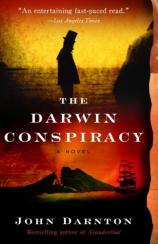The Darwin Conspiracy
Review
The Darwin Conspiracy
Victorian England is "my" period. Although it has a repressive
image, owing to whalebone corsets and equally stiff morality, it
also produced some of the most passionate writers, inventors,
reformers, and scientists the world has known: the Brontes, George
Eliot, Dickens...not to mention the author of THE ORIGIN OF
SPECIES, who is the subject (I don't want to say hero) of John
Darnton's THE DARWIN CONSPIRACY.
Darwin is still a controversial figure, even after a century and a
half. Recently, for example, he has come under attack by advocates
of Intelligent Design, who insist that the natural order is the
work of a higher entity or consciousness (religion masquerading as
science, if you ask me) and want this theory, rather than
evolution, to be taught in the nation's schools. (Whatever happened
to the separation of church and state?) In fact, I'd expected THE
DARWIN CONSPIRACY to have some bearing on this debate, but though
it is clearly sympathetic to the content of the great man's theory
--- Darnton's thrillers have all had a scientific or technological
twist --- in another way it questions his veracity (poor Charles is
getting it from both sides).
Essentially, Darnton invents a story to account for some puzzling
facts about Darwin's life --- the long delay (22 years!) between
the voyage of the Beagle and the publication of THE ORIGIN
OF SPECIES; his many chronic illnesses; his reluctance to travel;
his defensiveness when anyone challenged the legitimacy of his
authorship. Indeed, the crux of the matter in THE DARWIN CONSPIRACY
is whether this pioneering scientist "borrowed" his discoveries
from other people and then spent the rest of his life encumbered by
guilt and fear of discovery.
Darnton gives his book an elaborate temporal structure that is
positively awash in flashbacks. First, there is a modern story of
scientific/historical detective work with two protagonists: Hugh
Kellem, a former field investigator (part of a team studying
finches on one of the Galapagos islands) turned Darwin scholar; and
Beth Dulcimer, a descendant of Darwin's youngest daughter,
Elizabeth (who calls herself, confusingly, both Lizzie and Bessie).
They collaborate (and, of course, fall in love). Then there
are two 19th-century narratives: a reconstruction of Darwin's
experiences on the Beagle in the 1830s, and Lizzie's
journals and letters --- conveniently unearthed by Hugh --- from
the 1860s and 1870s.
As if this isn't complicated enough, Darnton introduces some
crashingly obvious parallel themes having to do with sibling
rivalry and father complexes. Hugh is trying to deal with the
purportedly accidental death of Cal, the older brother he idolized
(and whom he feels his father preferred). The young Darwin, too,
casting about for a career before he embarks on the Beagle,
is striving vainly for paternal approval, and Lizzie is always
being unfavorably compared with her elder sister, Etty.
That's a lot for Darnton to juggle, but he's well-coordinated ---
and besides, plot is pretty much the main thing this novel has
going for it. The notion of present-day researchers delving into an
historical mystery, with a parallel story set in the past, is
rather uncomfortably reminiscent of A.S. Byatt's marvelous
POSSESSION, but there the resemblance ends: Whereas Byatt's book
has the richness of real literature, THE DARWIN CONSPIRACY lacks
texture and depth. The historical portions are written more
effectively than the modern ones, probably because Darnton has
something solid to build on (although he is dismayingly eager to
show off his research). He generates real sympathy for the young,
uncertain Darwin of the Beagle and the assorted unstable
characters he ships out with; and Lizzie Darwin (of whom little is
actually known) is an endearingly feisty creation who becomes
suspicious of her father and herself embarks on a surreptitious
investigation of his papers and former contacts (but isn't it a bit
much to have her become pen-pals with George Eliot?). Hugh and
Beth, however, are ciphers, wooden and unconvincing, and their
pursuit of the truth is full of contrivances and implausibilities,
with amazing finds dropping into their laps at every turn.
Still, I admit, the book kept me reading for two days --- I really
wanted to know what happened on that fateful voyage --- and Darnton
comes up with a final twist that is both satisfying and original:
I'll say only that it involves the aboriginal peoples of Tierra del
Fuego as well as the Beagle's bad-tempered but intelligent
surgeon, who becomes Darwin's rival.
Ultimately, THE DARWIN CONSPIRACY reminds me of nothing so much as
(wait for it) THE DA VINCI CODE --- don't the titles even have the
same ring? Certainly there are differences (DA VINCI is probably
apocryphal rather than historical, while Darnton, an award-winning
journalist, is careful to document his work), but they are both
more screenplay than novel. If you're looking for a nice, light
entertainment with a sprinkling of natural science and history,
plus a bit of a mystery, try it. But if you want a genuinely good
book, go elsewhere --- perhaps back to the real 19th-century
thing.
Reviewed by Kathy Weissman on December 29, 2010




